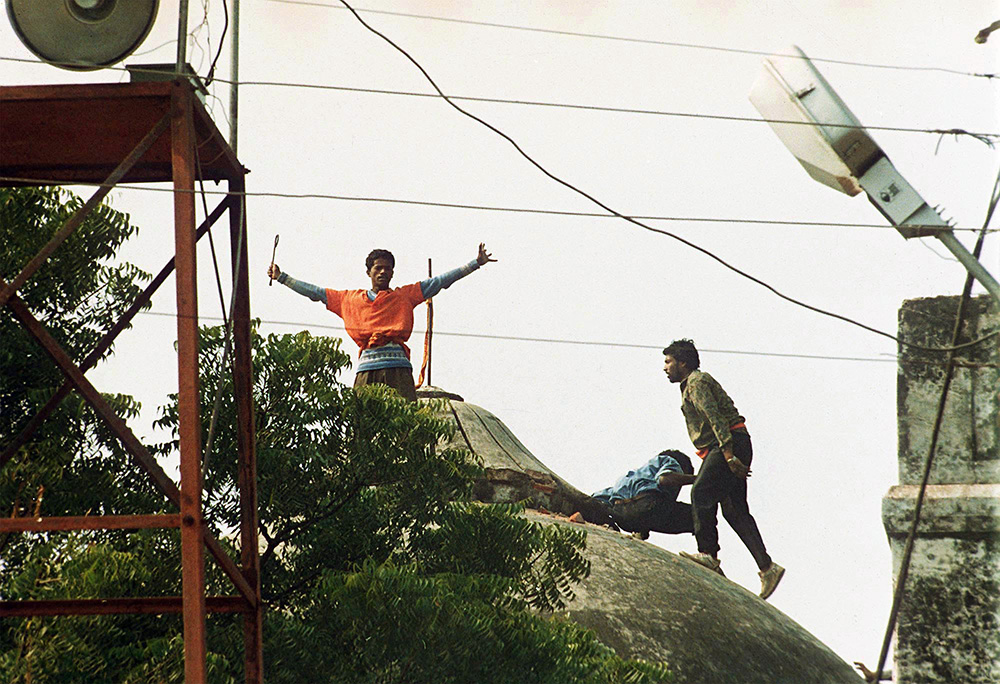
(RNS) — On Jan. 22, hundreds of thousands of Hindus in India will consecrate the Ram Temple, an ornate, three-storied structure built over more than three years in Ayodhya, in the northern Indian state of Uttar Pradesh. The ceremony will include sacred fires and the singing of Vedic hymns, while in the U.S. Hindu communities will celebrate with car rallies, festivals and parades. A massive billboard showing the temple already overlooks Times Square, one of 40 such displays across the country.
But behind the global festivities lurks a darker reality. The inauguration of the Ram temple implicitly commemorates one of the saddest chapters in Indian history: the hate-fueled destruction of the 500-year-old Babri Masjid.
One of the country’s most historically significant mosques, the Babri Masjid was torn down by violent mobs in 1992, egged on by Hindu nationalist agitators. It was an enormous act of dispossession that sparked riots across India, resulting in the deaths of hundreds of predominantly Muslim Indians and the destruction of countless Muslim homes.
Now this poisonous legacy threatens to affect both India and the broader Indian diaspora, as celebrants of the temple seek to whitewash its history and celebrate the temple as an innocent emblem of religious faith. Instead, the raising of the temple stands at the center of a profoundly bigoted political project pursued by India’s prime minister, Narendra Modi, and his Bharatiya Janata Party: Hindu nationalism.
Conceived by admirers of European fascism, Hindu nationalism is a movement that seeks to turn India into a purified, hierarchical Hindu ethnostate where Muslims and Christians, along with lower-caste and indigenous Indians, are reduced to second-class citizens or subjected to mass violence and expulsion. The movement caught fire with the destruction of the Babri Mosque, and the tragic event has since stood for Hindu nationalist desires to eliminate Muslim influence. The BJP has glorified the eradication of the landmark, while visiting the same fate on other mosques nationwide.
Hindu fundamentalists stand on top of one of the three domes of the Babri Mosque in Ayodhya, India, on Dec. 06, 1992, after storming the secured site. Thousands of Hindu extremists razed the 430-year-old Muslim mosque to the ground to clear a site for a proposed temple. (AP Photo/Udo Weitz)
Besides carrying out this campaign against mosques and destroying Muslim homes, Modi and the BJP have moved to criminalize Muslim prayer and interfaith marriage and empowered paramilitaries tied to the BJP to kill Muslims and Christians.
In September, Mahesh Kisanrao Landge, a BJP legislator, told supporters in a speech at a mosque in central India, “If there’s nothing done about this mosque, we can all do something about it… like what we did to the Babri Mosque in Ayodhya.”
The legal gambit that cleared the way for the new Ram temple in Ayodhya has become a pattern. Despite originally acknowledging the illegality of the demolition of the Babri Masjid, the Indian Supreme Court awarded the land where the mosque once stood to Hindu nationalist interests. In the wake of this ruling, other historic mosques, such as the Shahi Eidgah, Gyanvapi Mosque, Jamia Masjid and Shamsi Jama Masjid, have been made the subject of similar cases.
As they did in Ayodhya, Hindu supremacist groups are ordering surveys of the land beneath historic mosques for evidence of prior Hindu ownership.
The pernicious politics of the Ram Temple have come to the U.S along with the celebrations. Some American political organizations are importing deeply bigoted Hindu nationalist ideas and using them to influence U.S. politicians and Indian-Americans alike. Over the past few years, Sadvi Rithambara, a Hindu nationalist leader whose speeches have been described as “the single most powerful instrument for whipping up anti-Muslim violence,” has been addressing Hindu nationalist groups across the U.S.
In New Jersey, parades celebrating India’s independence from Britain in 2023 and in 2022 allowed Hindu nationalist groups to display hate symbols widely recognized in India as referring to the killing of Muslims and the destruction of their homes. In Frisco, Texas, one Hindu nationalist group raised funds for the destruction of churches in India. In Illinois, a Hindu nationalist group attempted to insert language into legislation supporting Hindu nationalist notions of India as a non-Muslim country.
Built on the negation of India’s long history of religious and cultural pluralism, and flaunted by the BJP as a way to attract support for its scheme to erase minorities, the Ram temple is nothing to celebrate. Americans, whose society and government is founded on pluralism and equality, should rather decry the temple for what it is: a monument to hate.
(Safa Ahmed is the associate director of media and communications for the Indian American Muslim Council. The views expressed in this commentary do not necessarily reflect those of Religion News Service.)

